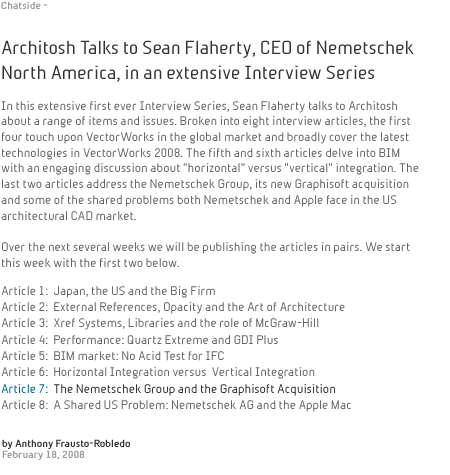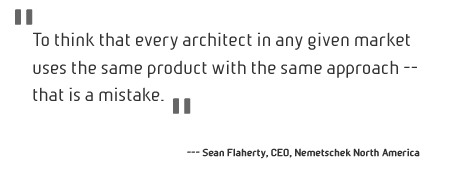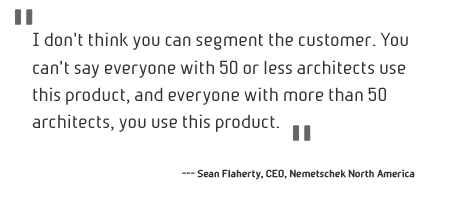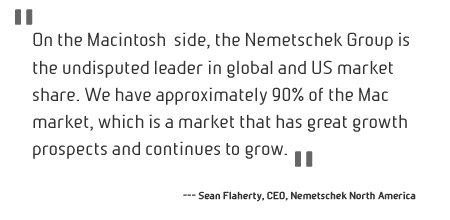|

Our
penultimate article in this extensive Interview
Series gets to some of the more
fascinating questions both VectorWorks and ArchiCAD
users have been wondering
about ever since Nemetschek AG acquired Graphisoft
last year. Why did they purchase ArchiCAD? How will
the German AEC software giant utilize not just two
but three competing BIM applications? Will these apps
eventually merge? How does the group focus and what
are some of the ways the group as a whole can leverage
combined assets? In this article we delve into these
questions.
This
article also mentions that the Nemetschek Group --
taken together -- is one of the largest organizations
with massive collective expertise in Macintosh software
development. Where will this expertise be taken next
within the arsenal of tools and technologies at the
Nemetschek Group's disposal? Read on.
The
Nemetschek Group and the Graphisoft Acquisition
AFR: I
want to switch gears and talk about Graphisoft directly.
In 2007 Nemetschek AG acquire Hungarian-based Graphisoft,
makers of ArchiCAD. Why?
(SF):
When they bought Graphisoft, it was a financial holding
company. It was to enrich the company's positions, and
they wanted Graphisoft for their financial results. They
[Graphisoft] occupied a key place in the global competitive
landscape, and now that is a part of the Nemetschek Group
rather than a part of another competitor.
That's
it?
(SF):
Those are the major reasons. The press was very unhappy
with that because they are used to more of a centrally
managed company like Autodesk. Their thinking goes..."well
I bought this so something will have to be replaced."
But
it doesn't really go down quite that way. Even in this
case we can see how that doesn't work in the situation
of Revit and Autodesk. They purchased Revit, but they
can't get rid of the use of AutoCAD and AutoCAD Architecture.
With
the Nemetschek Group we are running a very different
approach. You
guys don't think the Autodesk way...
(SF):
Nemetschek would like to see us not competing so directly.
When I talk about horizontal integration, that is an
example of us moving in a different direction -- that
over time will cement our position as the designer's
choice and differentiate us from the competition.
Even
though we talk to the same customers we come in with
different approaches.

We
are talking about approaches to practice and how, say,
a competitor like Autodesk approaches the market. What
I hear you saying is that different firms need different
tools because of their unique approaches.
(SF):
That is right. There are different packages for different
customer approaches. To think that every architect in
any given market uses the same product with the same
approach -- that is a mistake.
How
exactly then will the Nemetschek Group impress upon both
of your companies not to compete directly but have
different paths? Will one company focus on vertical integration
while the other focuses on horizontal integration, as
you defined earlier?
(SF):
To be honest, they are still trying to work that out.
For the past few years there has been no central strategic
management, so we have competed with everyone in the
group. In Germany we sell with Maxon's C4D (Cinema 4D);
in the U.S. we have a much stronger presence with our
own RenderWorks.
That
is how the holding company works. We have a fairly independent
operation here in the office in Columbia.

Some
assume the Nemetschek Group will direct Graphisoft to
focus on the bigger firms, but clearly VectorWorks Architect
already has global market share among bigger firms outside
the U.S.
(SF):
With Graphisoft, I don't think that is smart. I don't
think you can segment the customer that easily. You can't
say “everyone with 50 or less architects use this
product, and everyone with more than 50 architects, you
use this product.” Segmentation doesn't work that
way.
When
you look at ArchiCAD, when we go out to a customer, and
they say that having very good construction cost estimation
integrated into the product is important to them, well,
we can't provide that and that is something that ArchiCAD
does very well. But it doesn't have anything to do with
the size of the firm or whether or not they are a pure
architecture firm or an AE firm. That is something the
group is figuring out: how to make this friendly competition
idea work.
So
if you go into a firm to talk to them, and you find they
are working with ArchiCAD, do you say “that is
fine,” politely excuse yourself and move on to
the next potential new customer?
(SF):
No. I think we compete. We assess if they are happy.
Ultimately we are doing our best if we match up products
with real customer needs. To make a happy ArchiCAD customer
unhappy -- that is not doing anyone any good.
On the other hand, if we walk in to a firm and they
say all they really seem to be doing is 2D drafting
because
they can’t figure out how to use it for BIM,
then they are using the wrong product. Then we should
talk
to them.

Getting
back to the global importance of the Nemetschek Group.
Where is the group’s strengths?
(SF):
As I said, Nemetschek is quite big, but the name is not
well recognized and we want to improve on that--in the
U.S. in particular. We have global product lines with
high market share and unique technology in products from
Maxon and Graphisoft, for example. On the Macintosh side,
the Nemetschek Group is the undisputed leader in global
and U.S. market share. We have approximately 90% of the
Mac market, which is a market that has great growth prospects
and continues to grow.
The
press always cites Microsoft as being the second biggest
developer of Mac products outside Apple itself, but that
is just a seat and revenue picture. In terms of actual discreet
products, both Adobe and the Nemetschek Group produce
more major Mac products than Microsoft, which really
just makes one major product, Mac Office.
(SF):
The group has phenomenal Macintosh expertise. When you
add in Cinema 4D (C4D), we are a major Macintosh software
company. We have some of the best Mac graphics software
expertise in the world. I think we need to leverage this
story in the market. I think the Nemetschek Group needs
to pull this together. How can we bring in other products?
The group has a lot of really excellent European tools
products. We are looking at how we can extend the Nemetschek
range of products.
I
go to SIGGRAPH and I always visit the MAXON folks there.
I don't think the Nemetschek brand name ever comes up
in the booth, in the marketing. I think the Nemetschek
brand name doesn't get fairly associated with the products
behind it.
(SF):
That is an example of the thing we need to work on as
a group. Obviously customers narrow down the list of
who they will consider based on what their friend is
using. That friend may not have done any good technology
research at all. It is a momentum sale. The U.S. market
is very susceptible to that right now.
But
at least with the devices, machines, and solutions things
are changing a bit now. Look at Apple, for example.
(SF):
It is great to see people for the first time saying, "before
I go and buy the windows machine, I keep hearing all
this buzz about Apple, let me take a look at Macintosh”.
If you get them to do that, it is amazing how many will
buy it.
The
effect of word of mouth and buzz is tremendous.
(SF):
I think people didn't buy the Mac because they never
looked at it. They heard about it, but they are a simple
user so they are not going to break any trend -- which
is funny because they are exactly the people who should
be using a Mac.
It
is interesting how many people you hear that are unhappy
using AutoCAD. “Well what have you looked at beside
that?” we ask? “Ah nothing," they reply.
That is a shame. Maybe by raising our brand profile we
can do what is happening successfully with Apple.
articles:
|
1 | 2 |
3 | 4 | 5 | 6 |
7 | 8 |
Reader
Feedback: Talk to us:
|






![]()
![]()